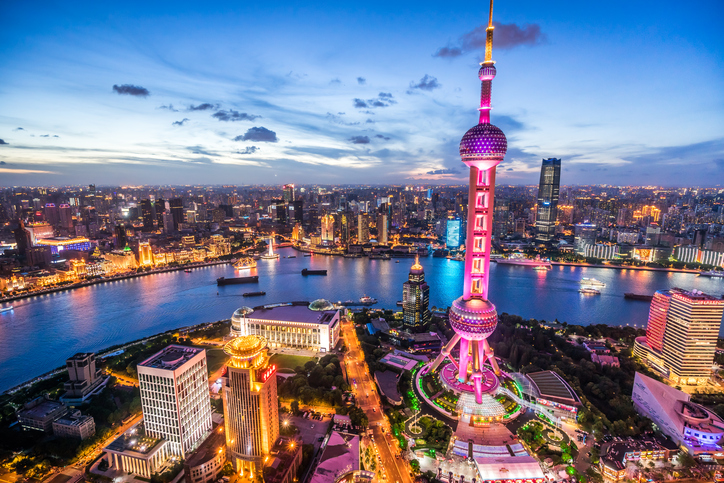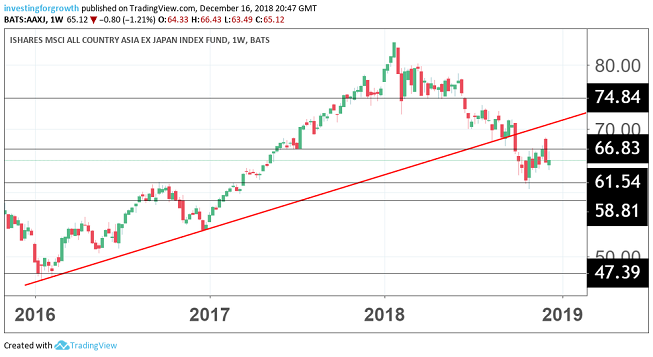Outlook for Asian equity markets in 2019: Abundant opportunities
21st December 2018 09:38
by Graeme Evans from interactive investor
Asian markets have been consumed by their own Brexit in 2018 – the China-US trade war – but Graeme Evans explains why the region could be attractive.

In the same way as Brexit dictated the mood of UK investors in 2018, there was only one story in Asia as markets fixated on the rise of protectionism and the tariff blows being landed in the China-United States trade war.
Instead of focusing on the potential offered by Asia's rapid population growth or burgeoning middle classes, many overseas investors went into hiding on fears that China's dispute with Donald Trump could derail its GDP prospects.
These anxieties were reflected in a double-digit percentage decline for the MSCI Asia ex-Japan index, with rising interest rates in the region and the stronger US dollar among the other factors. However, there are plenty of commentators who think that Asian equity markets now look good value at the start of 2019.
iShares MSCI All Country Asia ex-Japan

Source: TradingView (*) Past performance is not a guide to future performance
Deutsche Bank, for example, believes that the reality of the trade war is not as bad as portrayed by investor sentiment, particularly given the ability of Beijing to stimulate the Chinese economy if required.
Stefan Schneider, chief German economist at Deutsche Bank, sees opportunities in China, Korea and Japan in particular.
He added:
"High earnings expectations and comparatively low valuations could send stock prices rising in Asia’s emerging markets in 2019 and make the region attractive to investors."
Schneider forecasts economic growth in China of 6.3% in the coming year, which is below the 6.6% projected for 2018 but still should have a positive effect on the entire region.
This tallies with the most recent forecasts from the IMF and OECD at 6.2% and 6.3% respectively. India is projected to grow by as much as 7.4% next year. In both cases, the performance will comfortably exceed the forecasts for global growth or for the eurozone and the United States.
For Japan, Schroders sees GDP growth of 1% in 2019, little changed from 2018. The start of the year should benefit from reconstruction spending after recent earthquakes, floods and typhoons. However, VAT is due to rise to 10% from 8% in October and Schroders points out that previous hikes have had a significant impact on economic activity.
China has long had a record of finding ways to stimulate its economy so that it can keep GDP above the all-important 6% threshold. However, UBS warns that it may struggle to exceed 5.5% in the event of a full-blown trade war.
UBS added:
"If the tariffs do not increase in 2019 and trade tension de-escalates, the immediate negative impact on GDP would be much smaller but uncertainty may linger longer."
Property-related debt is one particular worry for those investors focused on China, given that it may constrain consumer spending.
Asian currencies have also been vulnerable to the rising US dollar and resulting emerging market capital outflows, forcing some central banks to hike interest rates in order to defend their currencies. That's been bad news for corporate profitability.
However, most forecasts point to a weaker dollar in 2019, which would help ease pressure on the region and help emerging market assets.
James Thom, investment director of Asian Equities, Aberdeen Standard Investments said the sell-off in the past year has made Asian equities look even more like a buy now.
He wrote in a recent article for our sister website Money Observer:
"We're confident that growing populations and rising middle classes and wealth can power domestic consumption for years. That encourages us to search for strong consumer companies well positioned to benefit from this structural dividend."
- Asian equities: Has falling knife hit the floor?
- Three good reasons why stockmarket investors must look beyond the UK
- Outlook for global equity markets in 2019
China has also been driving its economy towards domestic consumption, which can help insulate against currency weakness or the trade war fall-out.
Greg Kuhnert, Portfolio Manager, Investec All China Equity Fund, said the Chinese equity market entailed short to medium-term risks, most significantly policy execution and the ongoing trade tensions.
However, he added:
"We remain broadly fully invested in our portfolio as there are abundant opportunities that can be found in a dynamic market environment like China."
*Horizontal lines on charts represent levels of previous technical support and resistance. Trendlines are marked in red.
These articles are provided for information purposes only. Occasionally, an opinion about whether to buy or sell a specific investment may be provided by third parties. The content is not intended to be a personal recommendation to buy or sell any financial instrument or product, or to adopt any investment strategy as it is not provided based on an assessment of your investing knowledge and experience, your financial situation or your investment objectives. The value of your investments, and the income derived from them, may go down as well as up. You may not get back all the money that you invest. The investments referred to in this article may not be suitable for all investors, and if in doubt, an investor should seek advice from a qualified investment adviser.
Full performance can be found on the company or index summary page on the interactive investor website. Simply click on the company's or index name highlighted in the article.